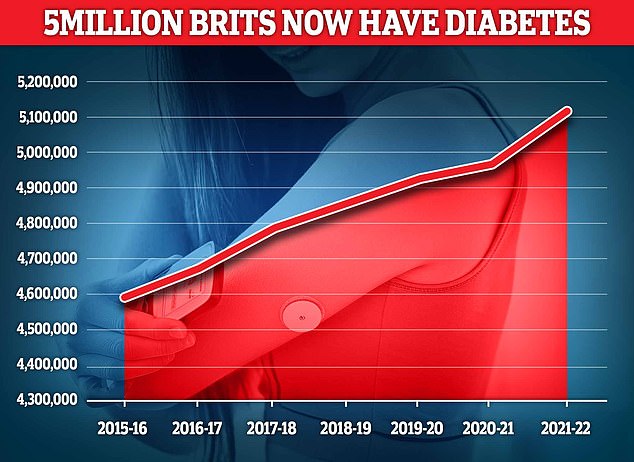Delaying the onset of diabetes for just four years can reduce the risk of heart attack by more than a third, a study has found.
Around one in nine adults in the UK have prediabetes, which means they have higher than normal blood sugar levels and are at increased risk of developing type 2 diabetes.
But researchers have found that they can reduce the long-term risk of death and cardiovascular problems through diet and exercise alone.
A team from the China-Japan Friendship Hospital analyzed data that had been previously collected from 540 people with prediabetes.
Participants were assigned to a control group or to one of three lifestyle interventions, which involved following a healthy diet, getting more exercise, or both.
Delaying the onset of diabetes for just four years can reduce the risk of heart attack by more than a third, a study has found

Nearly 4.3 million people were living with diabetes in 2021/22. And a further 850,000 people have diabetes and don’t know it at all, which is worrying because untreated type 2 diabetes can lead to complications such as heart disease and stroke.
The trial followed participants for more than 30 years.
The analysis found that those who remained non-diabetic for at least four years after their initial diagnosis of prediabetes had a significantly lower risk of dying and having a heart attack or stroke compared with those who developed diabetes earlier.
These people were 26 percent less likely to die and 37 percent less likely to suffer a heart attack or stroke compared with those who developed diabetes within four years.
Overall, the results suggest that the longer a prediabetic person can delay developing diabetes, the better their long-term health outcomes will be, the researchers said.
However, even a few years of maintaining a prediabetic state can produce benefits for many years.
In a paper published in the journal Plos Medicine, they said: ‘Our analyses showed that individuals who remained non-diabetic for at least four years after being diagnosed with impaired glucose tolerance had a significantly lower risk of death from any cause, cardiovascular events and microvascular complications compared with those who progressed to diabetes.
‘However, this effect was not observed in individuals who remained non-diabetic for a shorter period.’
They added that effective interventions targeting those with prediabetes should be considered as part of diabetes preventative treatment.
Previous research has consistently shown that, for some people with prediabetes, combined lifestyle interventions including diet, physical activity, and sustained weight loss may be effective in reducing the risk of type 2 diabetes.


